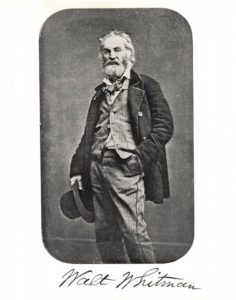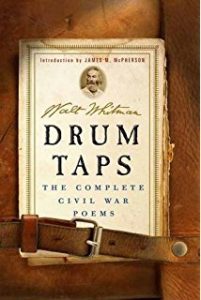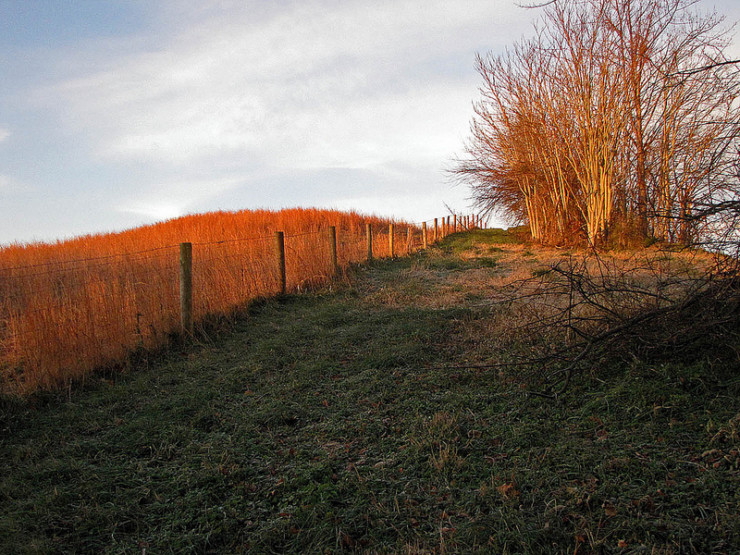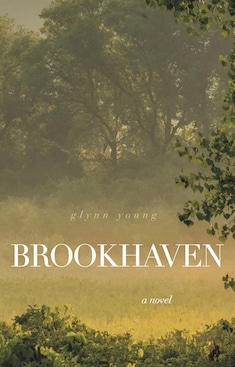Walt Whitman (1819-1892) is known as “America’s Poet,” and for good reason. His poetry captured the spirit of a country that was growing, expanding, tearing down, and building up, while still carrying the weight of its past.
Whitman may also be known as the poet of America’s Civil War. He wrote some 71 poems about the conflict, both during the war and after. Many of these poems were incorporated into various editions of Leaves of Grass. The first edition of Leaves of Grass , published in 1855, held just 12 poems. He kept revising, editing, and adding until the final edition had more than 400 poems, including many of the ones he wrote about the Civil War.

Whitman about the time of the Civil War
Whitman was 41 when the war began. The Civil War began with a burst of enthusiasm on both sides (mirrored 53 years later in Europe with the outbreak of World War I). You can read that enthusiasm in Whitman’s early war poems, including “Drum Taps,” “Cavalry crossing a ford,” and “Song of the Banner at Day-Break.” These are almost poems of celebration and patriotism, and to read them today is to make one wonder, with the benefit of hindsight, whether Whitman really knew what he was writing about.
The substance and tenor of his Civil War poems changed in December 1862. His younger brother George had been wounded at the Battle of Fredericksburg that month, and Whitman headed south in a desperate search to find him. He did find him, and it turned out that George had only been lightly wounded.
He had been one of the fortunate ones. The battle had been horrific for both sides, but especially for the Union forces. Some 1,300 Union soldiers had been killed and more than 9,000 were wounded. Many of them ended up in hospitals in Washington, D.C., and it was there that Whitman traveled, after assuring himself that George was safe.
Whitman spent the next 11 years in Washington. He spent the war years visiting the wounded and dying in hospitals. It changed his view of the war completely. He could see the devastation and destruction firsthand. He watched young men and boys die. He wrote letters for the injured. His poems about the war became darker.
Some of the poems, including one of the most famous ones about the war, involve Abraham Lincoln. Whitman was a deep admirer of the president, and often saw him in his carriage on the streets of Washington. In many ways, Lincoln represented what was right about America, including his determination to preserve the Union. His assassination in April 1865 devastated Whitman. And it resulted in one of the best known and best loved poems in American history.
O Captain! My Captain! (1865)
O Captain! my Captain! our fearful trip is done,
The ship has weather’d every rack, the prize we sought is won,
The port is near, the bells I hear, the people all exulting,
While follow eyes the steady keel, the vessel grim and daring;
But O heart! heart! heart!
O the bleeding drops of red,
Where on the deck my Captain lies,
Fallen cold and dead.
O Captain! my Captain! rise up and hear the bells;
Rise up—for you the flag is flung—for you the bugle trills,
For you bouquets and ribbon’d wreaths—for you the shores a-crowding,
For you they call, the swaying mass, their eager faces turning;
Here Captain! dear father!
This arm beneath your head!
It is some dream that on the deck,
You’ve fallen cold and dead.
My Captain does not answer, his lips are pale and still,
My father does not feel my arm, he has no pulse nor will,
The ship is anchor’d safe and sound, its voyage closed and done,
From fearful trip the victor ship comes in with object won;
Exult O shores, and ring O bells!
But I with mournful tread,
Walk the deck my Captain lies,
Fallen cold and dead.

Walt Whitman was the American everyman. His poetry celebrated the energy and drive associated with this relatively young nation, and it initially celebrated the onset of the Civil War. He embraced wild-eyed and enthusiastic patriotism and partisanship. But as the human deaths and suffering mounted, he could no longer ignore the costs. And so his poetry changed, and because it did, our understanding of the Civil War changed as well.
Related:
O Captain! My Captain! read by Tom O’Bedlam
Poetry and Remembering the Civil War: Allen Tate
Poetry and Remembering the Civil War: Robert Lowell
Photo by Scott1346, Creative Commons, via Flickr. Post by Glynn Young, author of the novels Dancing Priest, A Light Shining, and the newly published Dancing King, and Poetry at Work.
__________________________

“I require all our incoming poetry students—in the MFA I direct—to buy and read this book.”
—Jeanetta Calhoun Mish
- Poets and Poems: Katie Kalisz and “Flu Season” - April 15, 2025
- Poets and Poems: Michelle Ortega and “When You Ask Me, Why Paris?” - April 10, 2025
- Robert Waldron Imagines the Creation of “The Hound of Heaven” - April 8, 2025


Milton Finch says
I posted this over on a private Facebook page called The Patterson School Friends. Good stuff! Thank you!
Glynn says
Milton – I’m glad you enjoyed it. Thanks for sharing!
Bethany R. says
Interesting to hear about the evolution of his views and how that reflected in his poetry. Thanks for this, Glynn.